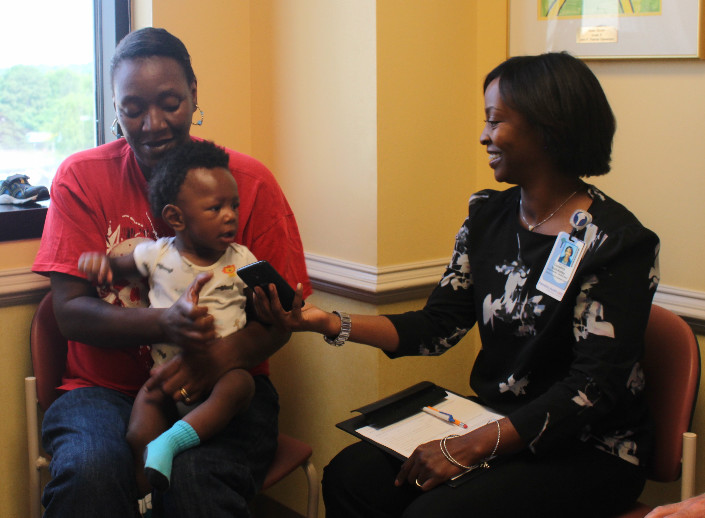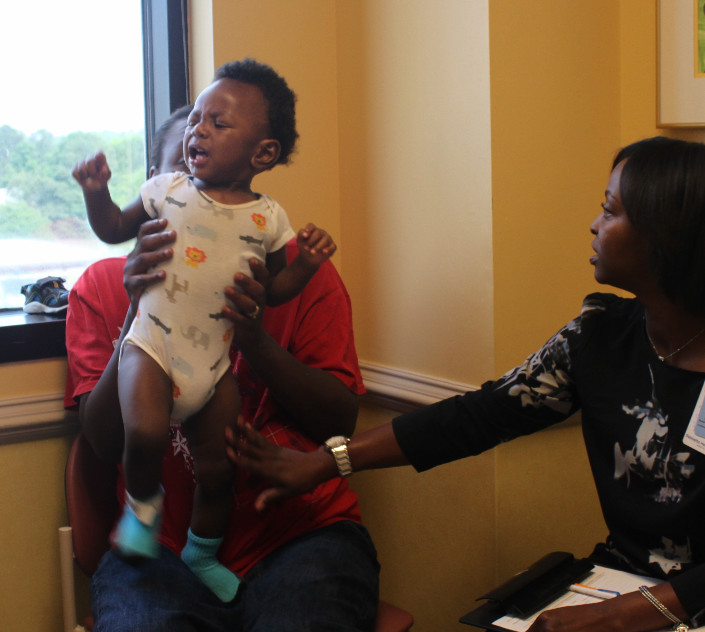Home visiting is a proven early-intervention strategy that pairs volunteer families with specialists who provide services throughout a child’s first five years to improve health, development, and early learning. Neil White, who tells the stories of Children’s Trust, looks at the Healthy Steps program at the Palmetto Health Children’s Hospital Outpatient Center, where families with newborns can receive health care and parenting information for their infants through pediatric visits and home visits.
A smiling Conethra Burt-Kelley leaned toward Vonetta Ervin in a small exam room at a Palmetto Health medical office and asked a few questions about Ervin’s 1-year-old son D.J.
Is he using his sippy cup? How many teeth does he have now? How are his eating habits?
Ervin supplied the answers about her son’s development, shaking her head as she said, “He’s eating everything in sight.”
Burt-Kelley liked that response. As the Healthy Steps specialist who works with new parents in the program that is currently serving 114 babies, infants and toddlers at the Children’s Hospital Outpatient Center, she monitors the health and development of young children. This program is supported by Children’s Trust, as South Carolina’s lead agency for the Maternal, Infant and Early Childhood Home Visiting (MIECHV) program.
Both she and a pediatrician speak to Ervin, followed by an exam of D.J. Afterwards, Burt-Kelley noted that she’ll bring outlet plugs for the electrical sockets on her next home visit. She also will make a point to check out his car seat to make sure it is installed properly for his size.
The home visits allow specialists like Burt-Kelley to work with parents in their home environment as well as pediatric settings. This work helps parents who may need help in learning how to care for a baby or young child. Ultimately, the goal is for children have that great start — physically, socially and emotionally– ensuring they are healthy and ready to learn.
The specialists can help with a wide range of things from from crib safety to general health concerns to developmental milestones like rolling over or walking. Home visitors generally have a background in social work, child development or nursing.

Conethra Burt-Kelley (right) chats with Vonetta Ervin and son D.J. during a pediatric visit at Palmetto Health.
“We’re here for them,” Burt-Kelley said. “We’re not watching to say, ‘You’re a bad mom,’ or ‘You’re a good mom.’ We’re there as a friend to give that added layer of support.”
Sara Sterne, nurse manager at the Children’s Hospital Outpatient Clinic, the site lead for the Healthy Steps program, credits the entire office staff, from the doctors to the nurses to the home visitors, for ensuring it’s fully supported. A teaching facility affiliated with the University of South Carolina School of Medicine’s Department of Pediatrics, the practice has 11 attending physicians and 36 pediatric residents.
“The team approach is the reason why it’s so successful. This is a great program,” Sterne said.
Sterne believes in the importance of reaching out to recruit more families into the voluntary program. First-time teen moms especially need the guidance of someone who works with them through well-child visits and sick visits at the practice as well as through the home visits. The partnership with Palmetto Health is one that has worked well. Sterne hopes to eventually have as many as 200 children in the program at the Children’s Hospital Outpatient Clinic.

Home Visit DJ
Burt-Kelley, one of two home visitors at this site, enters each relationship with a mission: “I’m trying to alleviate that feeling of, ‘I’ve got a new baby. What do I do?’” And she knows that she has built a special rapport when the moms begin to gain confidence and the babies begin to thrive.
When she hears of moms reading to their child, quitting smoking, taking care of their own health, continuing their education or looking for a job, Burt-Kelley gets excited. She wants to see those kids being raised in safe, stable environments while surrounded by love.
Burt-Kelley makes sure to listen closely to the answers mother give when being questioned the pediatricians, too. She is pleased to hear D.J. will be making his first dental visit the next day and presses Ervin to call her right away when they return home from that trip.
At the end of the visit, she expresses satisfaction with the progress shown, which she credits to the partnership between Children’s Trust, Healthy Steps, the doctors, nurses and staff for making everything run smoothly.
“The entire clinic supports this effort,” Burt-Kelley said. “Everybody believes in the program and wants it to succeed.”
Children’s Trust Manages MIECHV Grant
Through federal grants in fiscal year 2015, the fourth year of the home visiting program at Children’s Trust, home visitors in South Carolina made 13,362 home visits to 4,455 parents and children in 2,317 families.>
As this state’s federal grantee, Children’s Trust supports five evidence-based home visiting models – Healthy Steps, Healthy Families America, Nurse-Family Partnership, Parents as Teachers, and Family Check-Up – in coordination with 16 partners in 38 counties. Many of the program models serve at-risk, low-income mothers and, at times, medically-fragile children.
Children’s Trust believes in a socio-ecological framework emphasizing early childhood development within a system of strong family, community and society.

Eric Bellamy
Eric Bellamy, Children’s Trust home visiting program manager, pointed to the commitment of his staff, Cathy Ramage and Icelynn Baldwin, as well as the partners around the state for effectively broadening both the scope and strategic approach to a more comprehensive, high-quality early childhood system.
“It is the commitment of our agency and this home visiting initiative to continue to work closely with as many available partners and resources to enhance our skills, knowledge, outreach, advocacy efforts and capacity to serve our network of providers within this system,” Bellamy said. “It is the home visiting program’s goal to strengthen the infrastructure of this framework and to assist in decreasing risk factors and to increase protective factors. This can only be done with the joint efforts of a strong early childhood system.”
Bellamy is convinced a pediatric practice is a great way to reach those families in need.
“It affords Children’s Trust the strengthened ability to integrate home visiting programming in medical homes and serve families more efficiently and holistically,” Bellamy said. “For many families, the medical home or pediatrician’s care is a single point of entry for other needed services and one of the most trusted portals.”






